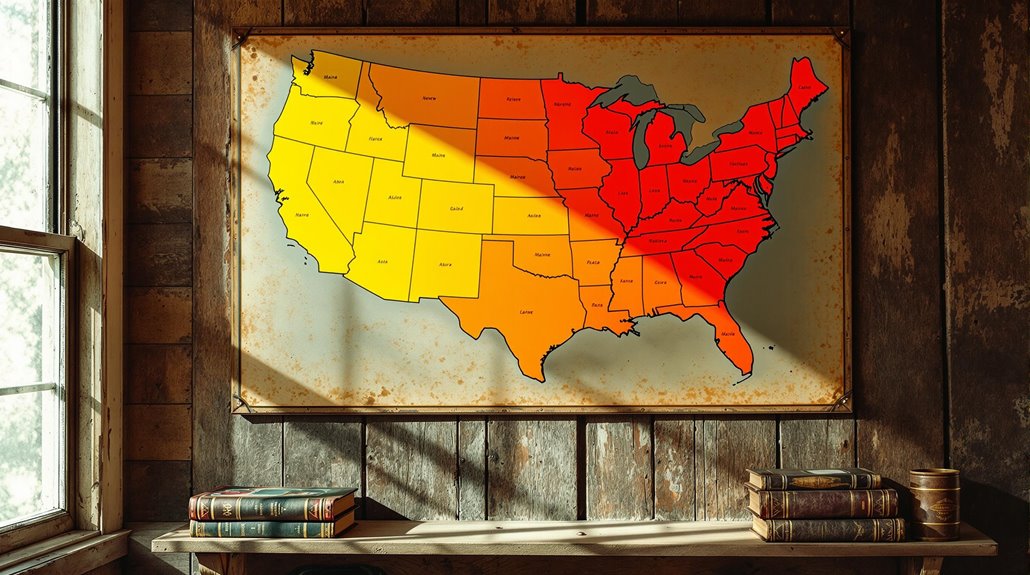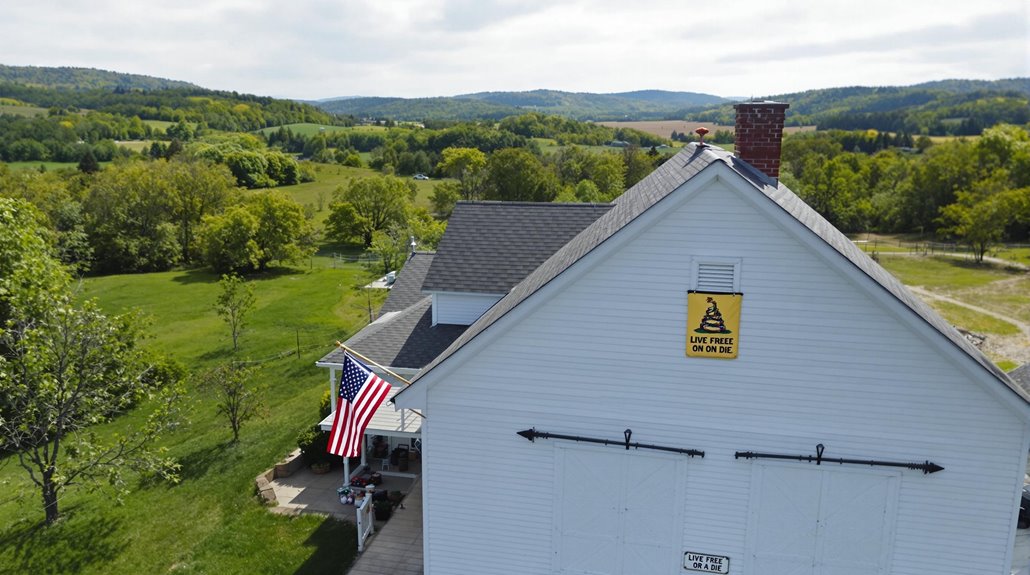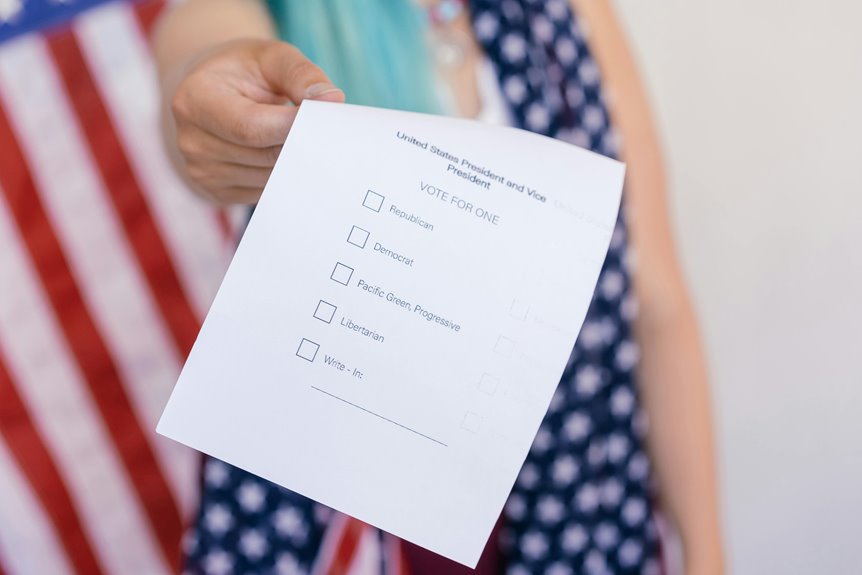You’ll find New Hampshire leading the pack as America’s most libertarian state, with its powerful combination of economic and personal freedoms. The state operates without income or sales tax, maintains one of the smallest state governments at just 6.4% of GDP, and fiercely protects individual liberties. Its streamlined regulatory environment and strong property rights create a haven for liberty-minded citizens. Beyond the surface metrics, NH’s commitment to freedom runs deep through every policy and practice.
Defining Libertarian Values and Metrics

Before we can determine America’s most libertarian state, we must establish clear metrics based on core libertarian principles. The fundamental tenets of libertarian philosophy emphasize maximizing individual autonomy while minimizing government intervention in both personal and economic affairs.
You’ll need to examine several key indicators: tax burden, regulatory environment, personal freedoms, property rights, and government spending levels. States earn higher libertarian rankings when they demonstrate low tax rates, minimal business regulations, strong private property protections, and respect for civil liberties.
Economic metrics include occupational licensing requirements, zoning restrictions, and public sector employment rates.
Personal freedom indicators encompass gun rights, school choice, cannabis laws, and restrictions on personal behavior. These metrics must be quantifiable, consistently measured across states, and directly tied to libertarian values of self-governance.
The Economic Freedom Factor
When it comes to finding America’s most libertarian state, you’ll need to look closely at who’s reaching deepest into your wallet.
A state’s tax burden reveals its true colors, with lower rates and simpler tax codes signaling respect for individual economic liberty.
Beyond taxation, you’ve got to examine each state’s regulatory landscape, where excessive business permits, licensing requirements, and compliance costs can strangle free enterprise faster than a bureaucrat can say “fill out these forms in triplicate.”
Tax Rates and Policy
Tax rates and policies reveal the starkest differences between liberty-minded states and their controlling counterparts.
You’ll find that states competing for businesses and residents through tax incentives have created a fascinating economic battleground, where freedom-oriented policies clash with heavy-handed regulation.
- New Hampshire stands out with no state income tax and no sales tax, making it a haven for liberty-minded individuals.
- Florida’s absence of state income tax has triggered significant tax competition with high-tax states like New York.
- Texas maintains its appeal through lower corporate tax rates and business-friendly regulations.
- South Dakota’s zero corporate income tax and no personal income tax structure exemplifies minimal government intervention.
These tax policies don’t just affect your wallet – they’re reshaping America’s economic landscape as citizens vote with their feet, moving to states that respect their financial autonomy.
Business Regulatory Environment
Money tells only part of the liberty story – a state’s regulatory framework shapes the daily reality of running a business.
You’ll find stark contrasts in how different states approach oversight, from stifling micromanagement to hands-off flexibility. States like South Dakota and Texas prioritize regulatory flexibility, maintaining basic safety standards while eliminating redundant requirements that burden entrepreneurs.
The most libertarian-leaning states have streamlined their business climate through one-stop permitting portals, minimal licensing requirements, and protection from arbitrary enforcement.
They’ve eliminated occupational licensing for non-safety-critical professions and stopped local governments from piling on additional regulations.
The result? In these states, you can launch a business in days instead of months, and you won’t need a team of lawyers just to understand the rulebook.
Personal Liberty Laws and Regulations
When you examine personal liberty laws across states, drug and vice regulations reveal stark contrasts between government overreach and individual freedom.
You’ll find dramatic variations in everything from marijuana legality and gambling restrictions to surveillance laws and digital privacy protections, with some states maintaining heavy-handed control while others embrace a hands-off approach.
Your personal autonomy faces its greatest test in how states regulate private behavior and data collection, making this a critical factor in determining which state truly champions libertarian principles.
Drug and Vice Laws
Despite claims of personal freedom, most states maintain a complex web of drug and vice regulations that severely restrict individual liberty.
While decriminalization efforts have gained momentum in states like Oregon and Colorado, most jurisdictions still enforce harsh drug sentencing laws that can derail lives over minor infractions.
- Cannabis remains fully illegal in 13 states, with penalties ranging from misdemeanors to felonies.
- Drug paraphernalia possession can trigger mandatory minimum sentences in 27 states.
- Private gambling faces restrictions in all but two states, Nevada and Louisiana.
- Personal vice activities like prostitution remain criminalized everywhere except parts of Nevada.
You’ll find the most lenient drug and vice laws in states that prioritize personal autonomy over moral legislation.
These states typically feature lower incarceration rates, reformed sentencing guidelines, and expanded harm reduction programs.
Personal Privacy Protections
Although personal privacy laws vary dramatically across states, the reality of digital surveillance and data collection has created an urgent need for stronger protections.
You’ll find that states like California and Maine lead the charge with extensive privacy legislation protecting consumer data rights, while others lag dangerously behind.
The divide between states’ privacy standards continues to widen. You can’t ignore how some states still permit employers to demand social media passwords, while others have enacted robust data protection measures.
Vermont stands out by requiring data brokers to register with the state and maintain specific security standards.
Meanwhile, Alabama and South Dakota have yet to pass basic privacy laws protecting your personal information from corporate exploitation.
The consequences are clear: your privacy rights depend heavily on your zip code.
Gun Rights and Second Amendment Policies
Three states stand out as America’s most gun-friendly jurisdictions: Alaska, Arizona, and Wyoming. In these states, you’ll find constitutional carry laws that allow citizens to exercise their right to gun ownership without government permits.
Their steadfast commitment to self defense has created a framework where law-abiding citizens maintain maximum Second Amendment freedoms.
- No permits required for concealed or open carry
- No registration requirements for firearms
- Stand-your-ground laws protecting defensive actions
- Protection against federal gun control measures
These states have established themselves as sanctuaries for Second Amendment rights, rejecting restrictive policies seen elsewhere.
You won’t encounter waiting periods, magazine capacity limits, or “assault weapon” bans. Their laws recognize that armed citizens can responsibly manage their own security, free from bureaucratic interference that plagues other jurisdictions.
Drug Policy and Decriminalization
Personal liberty extends beyond self-defense rights to bodily autonomy, making drug policy reform a key battleground for freedom.
You’ll find the most libertarian-leaning states pushing for drug decriminalization and cannabis legalization, with harm reduction programs replacing failed punitive approaches.
Oregon’s pioneering decriminalization law has transformed drug policy, treating addiction as a public health issue rather than a criminal justice matter.
You’re seeing states like Colorado and Washington lead the charge on cannabis reform, while New Hampshire’s “Live Free or Die” state tackles the opioid crisis through expanded addiction treatment access.
The stark contrast between progressive and restrictive states reveals how drug policy shapes personal freedom.
States maintaining harsh penalties for possession continue losing billions on enforcement while their neighbors reap tax revenues and reduced incarceration rates.
Government Size and Spending by State

When examining government size and spending across states, you’ll find dramatic variations that directly impact economic freedom.
The differences in government efficiency and spending priorities reveal which states embrace libertarian principles of limited government intervention.
- New Hampshire consistently ranks as having one of the smallest state governments, with government spending at just 6.4% of GDP.
- Florida maintains a lean state workforce, with only 89 state employees per 10,000 residents.
- Texas operates without a state income tax, demonstrating commitment to lower taxation.
- South Dakota’s government spending per capita ranks among the lowest nationally at $2,364.
These metrics show how some states manage to provide essential services while maintaining smaller governments, proving that efficient administration doesn’t require massive bureaucracies or excessive spending.
Property Rights and Land Use Laws
Strong property rights serve as the cornerstone of libertarian ideology, yet state-by-state analysis reveals stark differences in how governments respect or restrict private property freedoms.
You’ll find Texas and Wyoming leading with minimal zoning regulations and robust protections for land ownership, while states like California and New Jersey suffocate property owners with restrictive codes.
In states with stronger property rights, you’re free to develop your land without excessive government interference.
Montana and Idaho, for instance, maintain some of the nation’s most permissive land use policies.
Meanwhile, Hawaii’s complex web of regulations means you’ll need multiple permits just to build a shed.
Massachusetts requires environmental impact studies for even minor property modifications, and Vermont’s Act 250 creates a labyrinth of restrictions that’ll make your head spin.
Educational Choice and School Freedom
Educational freedom varies dramatically across states, with some offering expansive school choice while others maintain iron-fisted control over students’ learning options.
You’ll find stark contrasts in how states approach school vouchers, curriculum autonomy, and homeschooling laws.
- Arizona leads with universal school choice vouchers, letting families allocate up to $7,000 annually per child for private education.
- Florida’s expansive charter school system serves over 341,000 students across 687 schools.
- Idaho and Alaska maintain the nation’s most permissive homeschooling laws, requiring no state notification.
- New York and Massachusetts impose strict regulations, mandating extensive paperwork and curriculum reviews.
These differences create educational freedom havens in some regions while leaving families in other states fighting bureaucratic barriers just to choose their children’s learning environment.
Your location dramatically impacts your educational liberty.
State-by-State Rankings and Analysis

Ranking a state’s libertarian qualities demands rigorous analysis across multiple freedom indicators. You’ll find that New Hampshire and Florida consistently rank high in state comparison metrics, while California and New York typically land at the bottom.
The Cato Institute’s Freedom Index weighs factors like tax burden, regulations, and personal liberties to determine rankings.
When you examine the policy implications, you’ll notice that states with fewer regulations and lower taxes tend to score better on libertarian measures. States like Texas and South Dakota showcase how minimal government interference correlates with economic growth.
Yet even these “freer” states have room for improvement. Wyoming’s asset forfeiture laws remain problematic, while Nevada’s occupational licensing requirements still create barriers to entry in many professions.
Conclusion
You’ve seen how states stack up when it comes to libertarian values, but what’s the real story behind these rankings? While New Hampshire leads with its “Live Free or Die” ethos, low taxes, and minimal regulations, no state perfectly embodies libertarian ideals. Each jurisdiction makes tradeoffs between economic and personal freedoms. The key is understanding where your priorities align with state policies before making any major moves.





